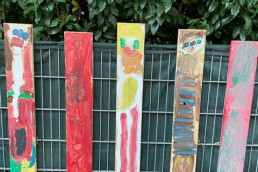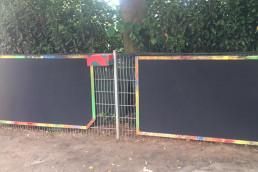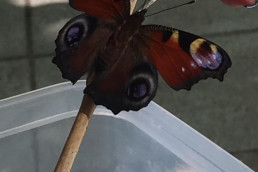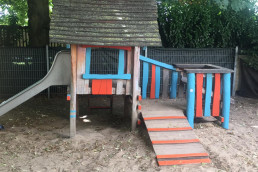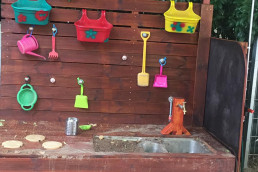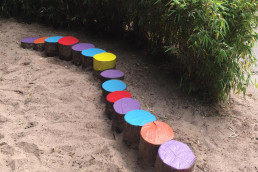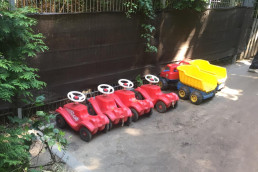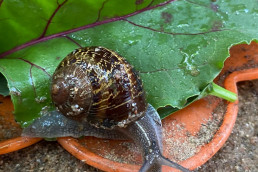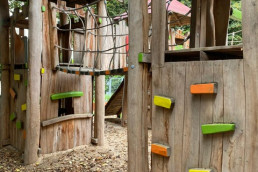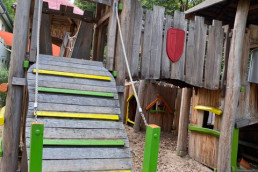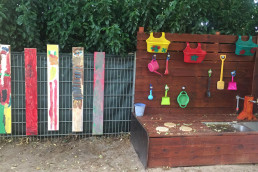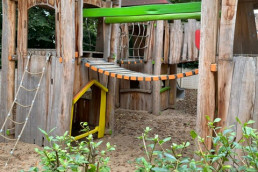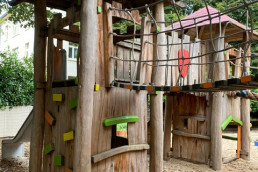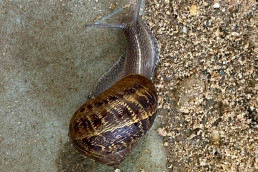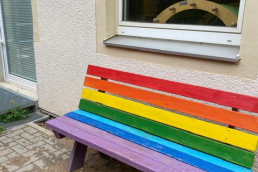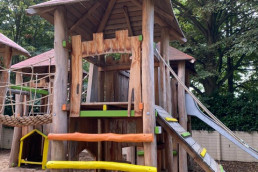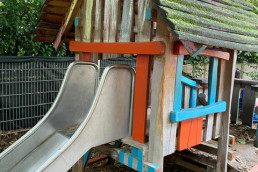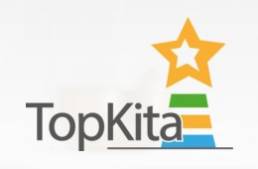rainbowtrekkers Junkersdorf
1. Structure
1.1 Location and contact details
The institution in Junkersdorf is located centrally in the Stadtwaldviertel (city forest quarter, formally Belgian Haelen Barracks).
1.2 History
The building complex in which our kindergarten is located was built in the 1930s as an army site for the German Army in cancellation of the provisions of the Treaty of Versailles on a demilitarized Rhineland. Towards the end of the war, forced labourer barracks were housed on the site. After the end of the Second World War until reunification, the site served the Belgian armed forces as so-called “Haelen” barracks. The area is still known by this name to many people in Cologne.
After the German reunification and the withdrawal of the Belgian forces, the new Cologne Stadtwaldviertel was built in the residential areas of the Belgian army members. The actual barracks buildings were listed as historical monuments and dedicated to social use and converted accordingly. We are glad and grateful that we are among the first tenants in history to be able to use the building for non-military purposes. The Cologne Sports Association and a facility for assisted living are still located on the site.
1.3 Number of places and age groups
In Junkersdorf there are 50 places for children aged 1-6 years.
1.4 Opening and closing times
Our regular opening times are from Monday to Friday from 7.30 a.m. to 4.30 p.m.
The institution regurlarly has 27 closing days per year. The closing times are announced in good time before the start of the kindergarten year.
1.5 Admission criteria
The demand is greater than the available places. Therefore, we decide on the allocation of places – transparent for all parents – according to the following criteria (in descending order of importance):
- Siblings of the child already visit the receiving institution.
- The child fits into the receiving group in terms of age.
- Once the child has been admitted, the group will have a balanced gender mix.
- The parents share the values and educational concept of the institution and declare their willingness to enter into an educational partnership.
- Admission of the child contributes to the social and cultural balance of the group.
- The family is new and without a family support network.
2. Spaces
2.1 Indoors
In Junkersdorf we have an interior space of about 550 square meters, all at ground level. While the multi-purpose room, the bistro, utility rooms and the rooms for the very youngest are facing Ulrich-Brisch-Weg, all group rooms open directly towards the outside area and garden.
The interior design by our pedagogical professionals aims to create an optimal balance between free play and educational activities.
The facility consists of three groups: the Bumblebees (approx. 10-12 one- to two-year-olds), the Butterflies (16-20 two- to four-year-olds) and the Dinosaurs (18-20 four- to six-year-olds).
The Butterflies’ group rooms are located in one wing of the building together with the multi-purpose room and the bistro, which are available to all children in all groups.
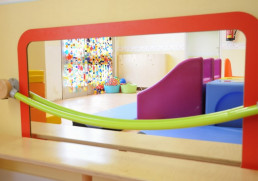
The Dinosaurs’ and the Bumblebees’ group rooms are located in the other wing of the building. Each group has its own sanitary area.
2.2 Outdoors
The outdoor area offers space for physical challenge and communal activities as well as rest and relaxation areas. There is a natural area with a maze, raised flower beds, trees and tepee. There is also a large climbing frame, a small playhouse, sand pits, swings and a balancing bridge. A sealed area in the middle can be used as a driving track for bobby cars and bicycles or as a common area for social events.
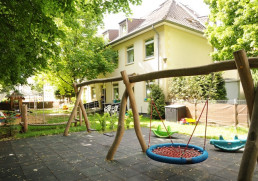
3. Materials
The age-appropriate educational materials offer the children of all three groups exciting and varied play opportunities. The majority of these play opportunities are freely accessible to the children to enable them to play independently. The regular turnover of the materials provides the children with new learning stimuli again and again.
Through play, children have the opportunity to let their creativity run free, to explore the environment and to actively engage with it.
The children gain new experiences and make new social contacts. This effect is especially achieved by the free play of the children and is encouraged and supported by the pedagogical professionals.
Some materials can only be found in the designated functional spaces, such as various instruments in the music room and movement material in the multi-purpose room.
4. Activities
In Junkersdorf, we pursue an eclectic pedagogical approach by picking out the aspects of various pedagogical approaches that are currently important to us, such as the situational approach, Reggio, Montessori, etc. and carrying out activities and projects with the children. Within the framework of a partially open concept, we work with core groups. These allow the children to move within a rather closed system at certain times and to open the doors at certain times. Opening the doors means for the children to get to know and use their facility across groups with all the functional rooms/areas.
Throughout the day, activities or projects are offered that are adapted to the children’s needs, situations, and individual stage of development.
The focal points of our day care center are movement, sustainability, and music. We have undergone further training and/or certification in all three areas.
4.1 Pedagogical work
We derive our pedagogical offering from the interests of the children and from our mission statement, which focuses on the diversity of families as a special value. From occasion-related pedagogical situations and constellations, the professionals develop thematic areas for the children in close teamwork, which can be integrated into the annual cycle, and which are based on the existing curriculum.
This ensures that the children are exposed to different traditional, cultural, and social themes over the course of a year.
Pedagogical content is developed in close cooperation between the pedagogical staff, the management of the facility and the headquarters, and ongoing processes are jointly reflected and adjusted as needed.
A regular early music program gives the children access to music, rhythm, singing, and movement in a playful and fun way. Dance and theatre projects also offer all children space to express themselves artistically and creatively.
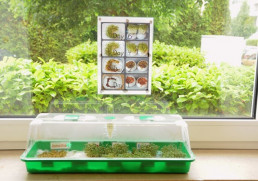
The perception of one’s own body and movement are elementary educational areas in the daily work. Through a variety of activities, the children are given the opportunity to sensitize their perception of their body and to express their urge to move. The group rooms, the outdoor area and the multi-purpose room are available to them for this purpose.
As a sustainable day care center, we also regularly deal with resource-saving behavior, the appreciation of nature and the environment, and the avoidance of waste.
4.2 Daily routine
The daily routine in Junkersdorf offers the children structure and security. The times can vary slightly depending on the groups. The same applies on days when special activities take place (excursions, projects, etc.).
In order not to interrupt the daily routine of the morning circle, we ask all parents to bring their children to the kindergarten by 9.30 am.
| Time | Program |
|---|---|
| 07.30 | Opening of the kindergarten |
| 07.30 – 09.30 | Breakfast/ Arrival |
| 09.30 – 10.30 | Morning circle |
| 10.30 – 11.30 | Pre-school/ Free play/ Activities/ Walk/ Garden time |
| 11.30 – 13.00 | Lunchtime |
| 13.00 – 15.00 | Quiet time/ Sleep time |
| 14.00 – 14.30 | Fort the older children: puzzles, reading, drawing |
| 14.30 – 15.00 | For the older children: free play |
| 15.00 – 15.30 | Snack |
| 15.30 – 16.30 | Free play/ Activities/ Garden time |
| 16.30 | Closing of the kindergarten |
4.3 Language acquisition
Language teaching is immersive and follows the principles of translanguaging.
Detailed information on the cognitive principles and practical application can be found in our language concept.
4.4 Inclusion
The institution is equipped to care for children with special inclusion needs.
The institution is largely wheelchair accessible.
4.5 Nutrition
Our day care center is supplied by a local caterer who prepares and delivers the hot lunch fresh daily. The weekly changing menu is child-friendly and well-balanced. Breakfast and healthy snacks for in-between meals are provided by the pedagogical staff.
The menu at rainbowtrekkers is vegetarian. When selecting the ingredients and the composition of our meals, the caterer follows the recommendations of the German Nutrition Society.
Food and shared meals also provide many opportunities to talk with the children, on the one hand about cultural differences in food selection and intake, and on the other hand with reference to sustainability, e.g., avoiding food waste, using regional products or less processed products.
4.6 Parent cooperation
The close educational partnership with the parents is an essential part of our work. We offer the opportunity for this in our daily informal chats in passing, as well as in regular weekly open consultation hours or set appointments. In addition, parents can inform themselves twice a year about the developmental status of their child in a confidential discussion.
At the end of the kindergarten period, parents and children are given the portfolio folder with the special stations of the past years. Those who would like to get involved in the parental interests can become part of the parents’ council and the kindergarten council.
5. Participation and self-advocacy
5.1 Participation
Everyday pedagogical life in Junkersdorf is designed with participation in mind. The children are involved in the daily decision-making processes by the professional staff. Both the design of the rooms and the pedagogical offering are carried out while considering the interests and needs of the children. The morning circles or joint meetings to discuss offers, projects, or activities on certain topics with the children are a particularly proven instrument in this respect.
At all meetings, as well as in individual discussions, the children can also express complaints or special wishes, which are discussed in the team if necessary and considered when planning.
5.2 Self-advocacy
There is a children’s parliament in our center.
Together with the children and the staff we work to develop “rules of procedure” that define the rights and duties of the “parliamentarians”.
6. Transitions
Transitions are a challenging developmental task for children, which we sensitively structure and individually support in our kindergarten.
At the beginning of the kindergarten period there is a settling-in phase, which is based on our tailor made settling-in concept.
At the beginning of the kindergarten period there is always an acclimatization phase, which at rainbowtrekkers is based on the Berlin Model. Acclimatization processes are very individual and are adapted to both family and cultural customs. In general, it is important to give the child enough time and stability to get used to its new environment and the small and big people. This important phase should last at least two to three months in order to give the child the opportunity to remember and recognize their new surroundings.
There is an internal transition first from the Bumblebees group to the Butterflies group and later to the Dinosaurs group. Internal changes, which take place about every 1 to 2 years due to age, are gently arranged and individually planned and prepared by the staff. Due to the partially open concept, in which a large part of the day is spent working across groups, a graduating child usually knows all the staff and all the children in the new group. This allows for a smooth transition without breaks because the child already sees itself as part of the community.
6.1 Pre-school support
The transition from kindergarten to school is a milestone in every child’s life. One of our goals is to prepare each child for school according to their development. In the last year of kindergarten, the pre-school children in Junkersdorf take part in a bilingual pre-school program within the Dinosaurs group, this is jointly designed by the pedagogues in the group.
The development of the children with regard to their school readiness is particularly observed, documented, and regularly reflected upon with the parents. The “preschool year” is a challenging and exciting time for all children, which is why close cooperation with all those involved is all the more important and has been supplemented by a special preschool concept.
7. Cooperation
Networking with our direct social environment as well as with many other institutions and organizations that are active in the region is important to us.
Transitions to school play a role here, which is why we work together with the Ildefons-Herwegen-Gemeinschaftsgrundschule, which is also located in Junkersdorf. The cooperation offers the opportunity to get a first impression of the school system and to exchange skills and competences and to prepare the children for school entry. Further cooperation in the context of school is currently being developed.
The focus on movement and sustainability has led to further cooperation with the table tennis department of the 1st FC Cologne, a beekeeper and EDEKA, which regularly stocks our raised bed with new plants.
Other educational offers, such as the cooperation with Lesewelten (Reading Worlds), which send volunteer reading mentors to the day care center, offer the option of getting to grips with language, books, and reading.
Meet the principal: Silke Blietschau
My name is Silke Biedermann and I am the principal of the rainbowtrekkers center in Cologne- Junkersdorf. I am born in Minden in Ostwestfalen, where a large part of my family still live, including my three adult children. I live with my partner in Cologne.
After my schooling, I first took the profession of chemical laboratory assistant. My own children and the contact to many other young families aroused my interest in child development and socialization processes. Therefore, over 15 years ago, I decided to study Social Education.
After my studies I gained experience in various fields. As a director of a project for early help for young families, in a language and reading promotion project, as a coordinator for a family center and as a kindergarten principal. I have been practicing this function for many years now with great pleasure.
It is important for me to have an open ear for all young and old people who are part of the kindergarten environment. I am happy to be a motivator or supporter for children, parents and team.
It is also important for me, in cooperation with all team members, to create spaces and opportunities for children in which they can develop individually as well as live out their exploratory urges. A good partnership with the parents is an important prerequisite for the children to feel safe and secure in order for them to pursue this exploration urge.
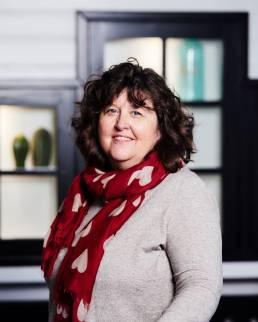
Deputies: Antje Pillunat and Nicole Watzke
We are Nicole Watzke and Antje Pillunat, together we form the team of the deputy management of the rainbowtrekkers Junkersdorf.
Nicole has been employed at our facility since 2021 and works here as a group leader in the Dino group with the 4 to 6 year old children. Antje has been employed at the rainbowtrekkers Junkersdorf since 2017, completed her apprenticeship year as an educator here and now works as group leader of the daycare group, the Bumblebees.
While Antje has always lived and resided in the Bergisches Land and Rhineland, Nicole comes from Dortmund and has lived in Cologne with her partner and dog since 2016. We both like to be active in sports in our free time, e.g. hiking or doing yoga, spend time with our (foster) dogs and enjoy musical events.
In her more than 20 years of work as an educator, Nicole has already worked and gained experience in different institutions. Her focus is on project work, movement education, relaxation education and reading picture books. Antje studied linguistics, pedagogy and art & design before becoming an educator and graduated with an M.A. degree.
During her time as a student, she was already very interested in the topic of “multilingualism” and was able to participate in two research projects on children growing up bilingually and multilingually. In the last few years, she has furthered her education to become a specialist for U3 children and a children’s yoga teacher, among other things.
It is important to both of us to accompany the children in this significant stage of their life and to support them again and again in their individual development. All families, especially those with a multilingual or multicultural background, should feel comfortable with the rainbowtrekkers and be happy to leave their children in our care.
We are looking forward to working together with the facility manager Silke Blietschau on the further development of our facility and to expanding our experience with an insight into the field of management!
Contact
rainbowtrekkers Junkersdorf
Principal: Silke Blietschau
Deputy: Antje Pillunat und Nicole Watzke
Ulrich-Brisch-Weg 1
50858 Köln (Cologne), Germany
Tel.: +49-221-650 324 26
silke.blietschau[at]rainbowtrekkers.de
Members of:




